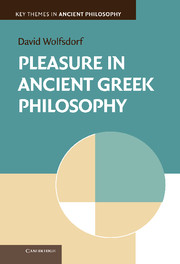Book contents
- Frontmatter
- Contents
- Acknowledgments
- Chapter 1 Introduction
- Chapter 2 Pleasure in early Greek ethics
- Chapter 3 Pleasure in the early physical tradition
- Chapter 4 Plato on pleasure and restoration
- Chapter 5 Plato on true, untrue, and false pleasures
- Chapter 6 Aristotle on pleasure and activation
- Chapter 7 Epicurus and the Cyrenaics on katastematic and kinetic pleasures
- Chapter 8 The Old Stoics on pleasure as passion
- Chapter 9 Contemporary conceptions of pleasure
- Chapter 10 Ancient and contemporary conceptions of pleasure
- Suggestions for further reading
- General Index
- Index of Greek and Latin Words and Expressions
- Index of Quotations from Ancient Authors
- Index of Quotations from Contemporary Authors
- References
Chapter 9 - Contemporary conceptions of pleasure
Published online by Cambridge University Press: 05 December 2012
- Frontmatter
- Contents
- Acknowledgments
- Chapter 1 Introduction
- Chapter 2 Pleasure in early Greek ethics
- Chapter 3 Pleasure in the early physical tradition
- Chapter 4 Plato on pleasure and restoration
- Chapter 5 Plato on true, untrue, and false pleasures
- Chapter 6 Aristotle on pleasure and activation
- Chapter 7 Epicurus and the Cyrenaics on katastematic and kinetic pleasures
- Chapter 8 The Old Stoics on pleasure as passion
- Chapter 9 Contemporary conceptions of pleasure
- Chapter 10 Ancient and contemporary conceptions of pleasure
- Suggestions for further reading
- General Index
- Index of Greek and Latin Words and Expressions
- Index of Quotations from Ancient Authors
- Index of Quotations from Contemporary Authors
- References
Summary
I will conclude this study with an examination of the ancient contributions in relation to contemporary conceptions of pleasure. To that end, this penultimate chapter presents an overview of contemporary treatments of pleasure. As with my discussions of the Greek material, my treatment of the contemporary material is, among other things, intended to underscore the historical nature of the contributions – and this is so, even while some of the history here is very recent. In the course of the chapter, the reader will also notice many points of comparison with the ancient material. To facilitate the exposition, I note some of these points, but relegate them to footnotes. Once again, I return to the points of comparison, which will be the focus of the discussion, in the final chapter.
INTRODUCTION TO PHILOSOPHICAL EXAMINATION OF PLEASURE IN THE CONTEMPORARY PERIOD
In the first half of the twentieth century, philosophical discussion of the identity question was sparse. Contrast the work of psychologists who had been examining the nature of pleasure extensively since the end of the nineteenth century, that is, since the work of Wilhelm Wundt (1832–1920) and Edward Titchener (1867–1920). It was only in the second half of the twentieth century that philosophers began a concerted examination of the identity and the related kinds question. Accordingly, I will refer to this period of philosophical investigation of pleasure as the “contemporary” period.
- Type
- Chapter
- Information
- Pleasure in Ancient Greek Philosophy , pp. 214 - 268Publisher: Cambridge University PressPrint publication year: 2012



